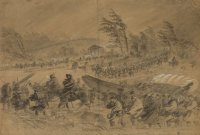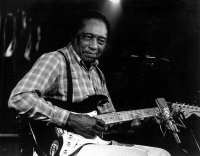OneManGang
Senior Member
- Joined
- Sep 7, 2004
- Messages
- 2,045
- Likes
- 9,730
Tennessee vs The Maxims vs West Virginia
As debuts go, Saturday's 40-14 loss at the hands of West Virginia was less than auspicious for the Jeremy Pruitt era on The Hill. The 2018 Vols looked a lot like the 2017 Vols. But then the 1977 Vols looked a lot like the 1976 edition. Unlike 1977, there are now multiple outlets where armchair coaches and the professionally sourpuss can vent their hurt feelings, mostly revolving around Tennessee's failure to hire My Guy.
* * * * * * * * *
The commanding general of the Army of the Potomac, General Ambrose Burnside had a problem. He needed to do something spectacular to keep his job and to raise the morale of his dispirited army. That low morale stemmed from the recent Battle of Fredricksburg. It was a disaster for Burnside's army so complete that it caused no less a personage than Robert E. Lee to remark, “It is well that war is so terrible, else we should grow too fond of it.”
Burnside had gained his ultimate command after the Battle of Antietam, fought on 17 September 1862. Infamous as the “bloodiest day” in American history with nearly 23,000 casualties combined from both sides and nearly 4,000 dead, Antietam was a tactical draw but since the Confederates withdrew, the Union could claim a victory. Burnside had gained some fame from the battle by repeatedly hurling the 13,000 or so men of his IX Corps against about 500 Confederate defenders on the other side of a bridge over Antietam Creek. Burnside sent his men across the bridge reducing the front of his host to the eight or ten guys who could march abreast over the bridge. 13,000 vs 500 is a rout. 500 versus a dozen or so is a rout in the other direction. Toward the end of the day, the federals finally took the bridge but at great cost. Antietam Creek at the bridge is about three feet deep. Despite repeating prodding from the President to go after the Confederates, Union commander George McClellan refused and got himself fired and Burnside was named as his successor.
With the dawning of 1863, Burnside decided to leave a force in place near Fredericksburg to force Lee to keep his forces there. Meanwhile, he would lead the bulk of his army out of their camps near Falmouth, VA to cross the Rappahannock River upstream and outflank the Confederates and march on to Richmond. Better yet, since the previous battle the weather had been moderate and dry, perfect for such a move.
Burnside sold the scheme to Lincoln and on the morning of 20 January the blue host marched out in sunshine over hard dry dirt roads toward Banks Ford. The dirt roads turned to powder-fine dust as the army marched on. In the procession came cavalry, bands, infantry, artillery, supply carts and a number of large wagons toting the pontoons Burnside needed to build the five bridges across the river to support his army on the other side.
Around noon, clouds began to appear on the horizon and by late-afternoon a steady drizzle was falling. The army made camp and by nightfall the drizzle became a downpour. Troops awakened to a landscape of mud. They could not even find kindling to make fires for their morning coffee. Orders were orders, however, and the march resumed. Burnside's timetable called for the army to reach the river by afternoon with all five bridges in place by nightfall on the 21st. The army moved out and promptly sank in the mud.
The passage of tens of thousands of feet, hooves, steel rimmed wooden wheels and the whole panoply of a Civil War army churned the sodden roads and lanes into morasses that swallowed cannons, caissons, wagons and animals. Entire regiments were used to try to tug those pontoons the last couple of miles to the river in vain. Worse, those troops who had actually made it to the riverbank discovered that Old Marse Robert had not been so easily fooled and strong Confederate entrenchments now overlooked Banks Ford. From those fortifications, the Rebs jeered as the Bluecoats floundered about, “Burnside's Army – stuck in the mud!” they laughed. Others held up crude signs with arrows pointing in various directions stating “Richmond This Way.”
All throughout the 21st the Union host struggled. As many as 300 men pulled ropes to move a single cannon a few yards. Infantry units left the roads to try to cross the fields only to find they were now swamps. Still the rains fell and the temperatures fell with them. The army made a cold camp that night, shivering in the chill and wet. Food was scarce and sleep scarcer.
On the morning of the 22nd with the rain still pounding, Burnside approved giving the men a whiskey ration to warm them up. The brown liquor flowed into empty stomachs and soon most the army was roaring drunk. In one instance, two entire regiments which bore grudges against each other squared off in what may have been one of the largest fistfights in history.
By noon, even Burnside could see that it was futile. He ordered the army back to Falmouth. He then traveled to Washington and tendered his resignation and Lincoln named Gen. Joe Hooker to command. Besides lending his name to the World's Oldest Profession, Hooker would keep his own rendezvous with disaster near a crossroads named Chancellorsville.
*********
Vol fans can be forgiven if they sympathize with those Union soldiers of the long ago. Tennessee football seems to have been on its own “Mud March” for over a decade. Over those ten years the Vols have had five Head Vols – the same number as over the previous FIFTY.
One game is not enough to judge a Head Vol. However, there still seems to be a lot of mud between where the Vols are, and where they should be.
So how did the team do compared to the Maxims?
1. The team that makes the fewest mistakes will win.
Tennessee football is still paying the price for many, many wrong moves and disappointments covering the time since the current team was in grade school. If, as your fearless scribe has said before, teams have to learn to win big games, Our Beloved Vols, it seems, need to learn how to win, period.
2. Play for and make the breaks. When one comes your way … SCORE!
There was still entirely too much standing around and waiting on somebody else to make the play, a condition which has plagued the Vols for a long time.
3. If at first the game – or the breaks – go against you, don’t let up … PUT ON MORE STEAM!
My learned colleague CharterVol took the Civil War analogy a step further and pointed out that Pruitt's decision to keep the offense in on fourth-and-goal may be a turning point much like that when Grant pulled his battered army out of the Wilderness Battle and moved left toward Richmond, something nobody else had ever done and catching Marse Robert off guard. A year later came the surrender at Appomattox.
4. Protect our kickers, our quarterback, our lead and our ballgame.
Despite a few flashes, Tennessee struggled the entire game.
5. Ball! Oskie! Cover, block, cut and slice, pursue and gang tackle … THIS IS THE WINNING EDGE.
The Vol defense was shredded and that was supposed to be their strong point. On the other hand, pre-season appraisals are generally not worth the electrons it takes to generate them.
6. Press the kicking game. Here is where the breaks are made.
This Maxim speaks (as do virtually all of them) to attitude. Punting averages and long kickoffs aren't really the point. The point is that the opponent should FEAR Tennessee's kicking game. And, there you go.
7. Carry the fight to West Virginia and keep it there for sixty minutes.
Tennessee has not put forward a complete sixty minutes of effort in far too long and that still seems the case,
Bottom line, Coach Pruitt has his work cut out.
The mindless blitherers on sports radio and the internet would do well to remember that this was Coach Pruitt's first game as head man at ANY level. There will be a learning curve and there will be a price for that learning. However, before arriving on campus in 1926, The Gen'rul had never been a head coach anywhere, either.
Stay tuned.
MAXOMG
© 2018 Keeping Your Stories Alive
Suggested Reading:
Bruce Catton, Glory Road
Shelby Foote, The Civil War: A Narrative, Vol 2, Feredricksburg to Meridian
Russell Weigley, A Great Civil War
The Mud March (National Archives)

Last edited:



